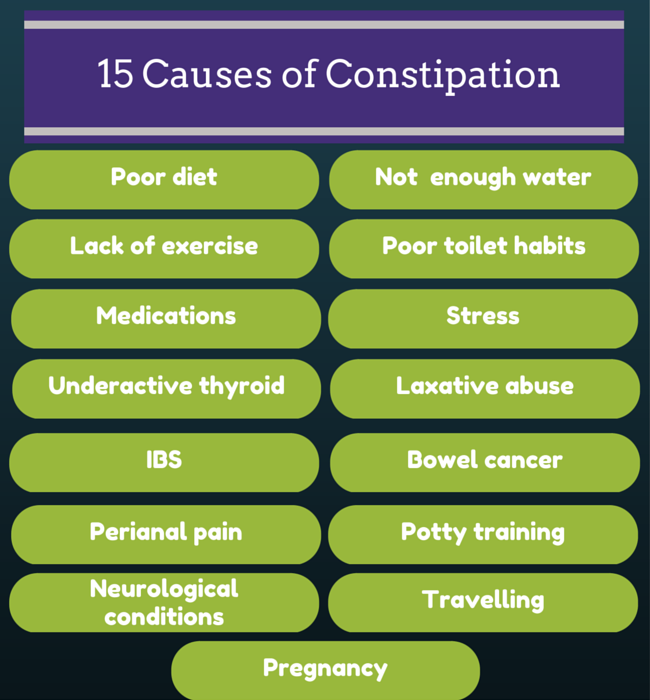There are many causes of constipation including poor dietary habits, lack of physical activities, and irritable bowel syndrome.
1. Poor dietary habits causes constipation.
The single most important cause of constipation is poor dietary habits. Dietary fiber is essential for a smooth bowel movement. An average adult needs about 30 g of fiber every day. The dietary fiber absorbs water and swells up in the large intestine. That makes the stools soft and easy to pass. Lack of fiber in the diet makes the stools hard and difficult to pass.
Consumption of large amounts of dairy products can also make you constipated. Drinking too much coffee and eating large amounts of chocolate are other causes.
2. Not drinking enough water
We need plenty of water to get regular bowel movements. If you don’t drink enough water, you will be dehydrated. That makes your body reabsorb more water from the large intestine. It will make the stools dry and hard.
3. Lack of physical activity
Do you know that laziness makes the bowels lazy? There is a relationship between levels of physical activity and bowel habits. Low levels of physical activity are one of the leading causes of constipation.
4. Poor toilet habits
One day you go to the toilet in the morning to empty your bowel. The next day morning you are busy and you avoid the toilet. So, you try to pass stools in the evening. You find it hard. This kind of lack of toilet routine is not going to help your bowels.
5. Medications can cause constipation
Some medications such as codeine, Tramadol, and antacids can make you constipated. Click here for a comprehensive list of constipating medications.
6. Too much stress can cause constipation
Stress causes an imbalance of many hormones in the body. The hormonal imbalance makes slow bowel movements.
7. Under-active thyroid
The thyroid gland is situated at the front of the neck. It secretes a hormone called thyroxine. This thyroid hormone controls many metabolic activities in the body.
Under-active thyroid (hypothyroidism) is a common medical condition that can cause constipation. Weight gain, tiredness, cold intolerance, depression, and hair loss are the other symptoms of hypothyroidism.
8. Laxative abuse
Laxatives are medications that help relieve constipation. Some people use laxatives without any clear indications. Sometimes people use laxatives to lose weight. This sort of laxative abuse can make the bowels ineffective. The ineffective bowels can’t contract properly. That makes the accumulation of stools in the bowel.
So, use laxatives only if you have constipation.
9. Irritable bowel syndrome
Irritable bowel syndrome (IBS) is a functional bowel disorder that causes constipation, diarrhea, and abdominal pain. The majority of people with IBS complaint bowel movement immediately after eating. This condition is also known as spastic colon or irritable colon.
IBS is a common condition that affects one in five adults. There are three types; constipation-predominant, diarrhea-predominant, and constipation alternating with diarrhea.
10. Bowel obstruction is a serious cause of constipation
Constipation can be a symptom of bowel obstruction which may be a sign of serious disease such as bowel cancer. If you are over the age of 50 or anyone in your family has bowel cancer (colorectal cancer) and you have altered bowel habits, you should consult your doctor.
11. Pain around the anus
Medical conditions that cause perianal pain can cause hard bowel movements. Anal fissure, thrombosed piles, and genital herpes are some of the causes.
Surgical procedures in the pelvic area such as hysterectomy can also make you constipated.
12. Improper toilet training
You have a toddler and you want to toilet train him. You don’t know where to start. You search the internet and find a great article “How to potty train in a week”. You push him to make a quick change. Don’t be surprised if he gets severe constipation.
13. Neurological conditions
Some nervous system disorders can cause chronic constipation. Parkinson’s disease, multiple sclerosis, diabetic autonomic neuropathy, and stroke are examples. People with spinal cord injury may also experience difficulty in passing stools.
Hirschsprung disease is a congenital condition that affects babies. Colonic nerve cells that are essential for the bowel movements are absent in this condition.
14. Travelling
Constipation is common when travelling long distances. Changes in routine, dehydration, and stress associated with traveling are the main causes.
15. Pregnancy and childbirth
Constipation is a common problem in pregnancy. It affects approximately 50% of pregnant women. Hormonal changes during pregnancy cause sluggish bowel movements. In addition, the growing uterus exerts pressure on the rectum.
Soon after the childbirth, you will feel pain around the anus. That can make your bowel movements difficult.
